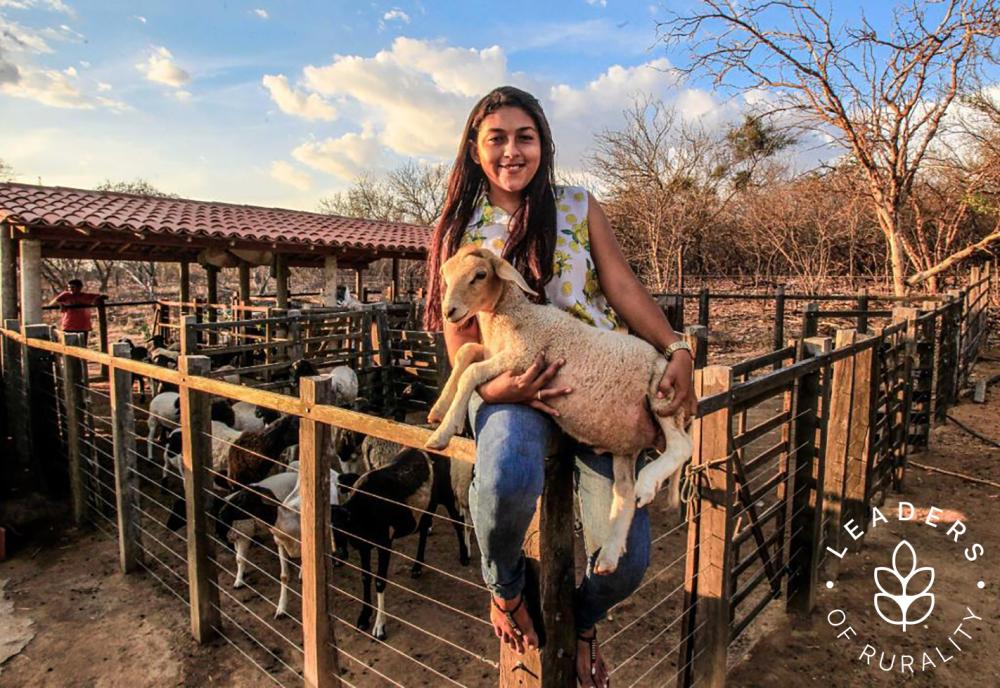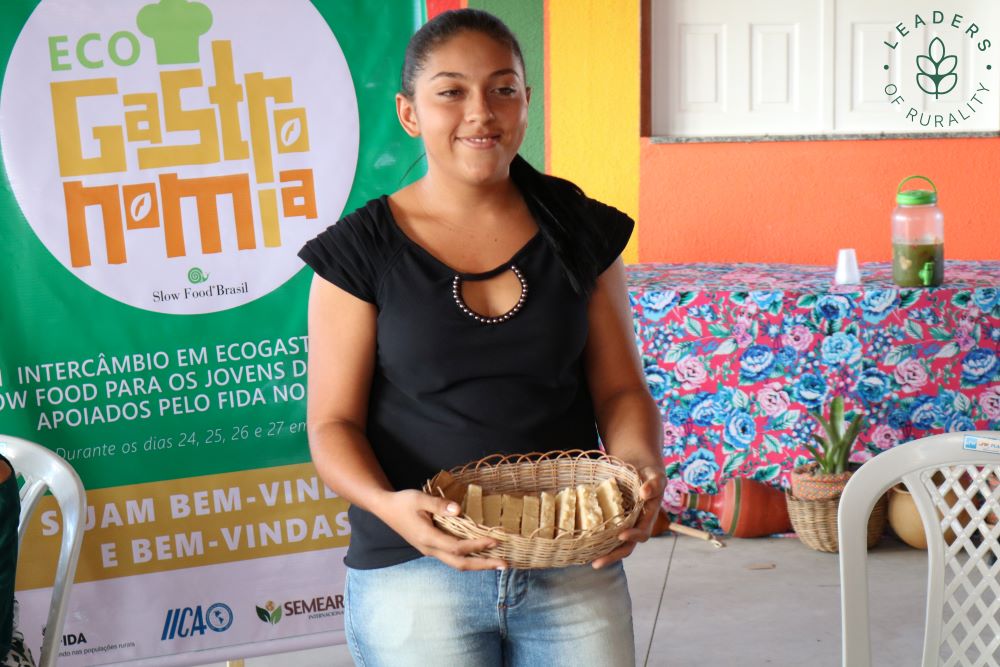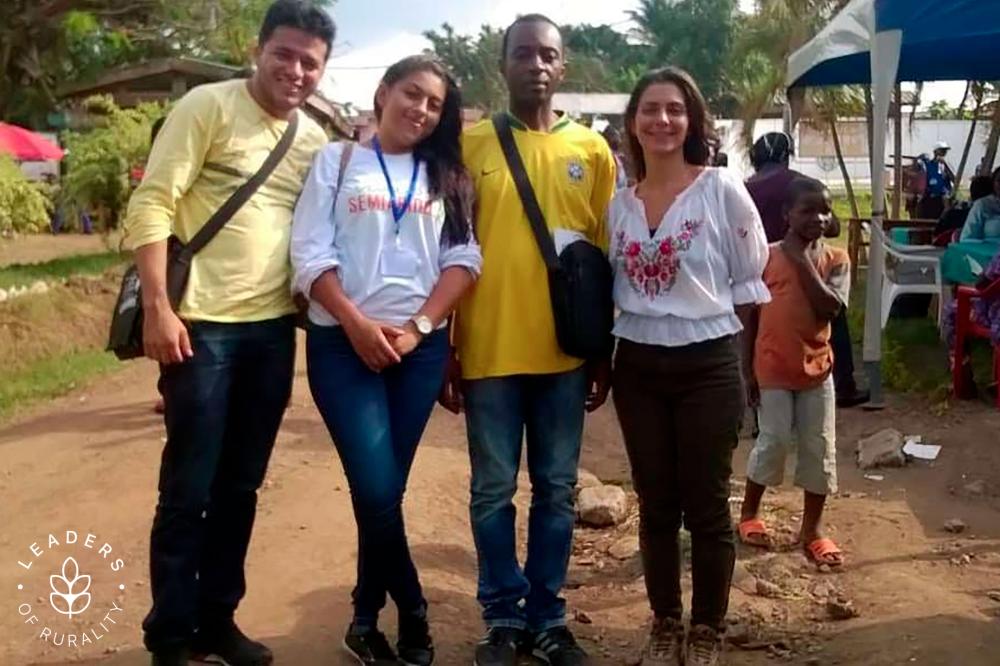The daughter of rural farmers from Betânia, a municipality in the state of Piauí, Francisca is now 25 and is Secretary of Family Farming, a position from which she promotes associativism and cooperativism to improve income and quality of life for small-sized farmers.

Brasilia, 4 July, 2022 (IICA). The young Brazilian Francisca Neri, who at the age of just 22 became president of the Association of Sheep and Goat Breeders in a municipality in northeast Brazil and motivated other young people to take an interest in livestock farming, has been recognized as one of the “Leaders of Rurality” of the Americas by the Inter-American Institute for Cooperation on Agriculture (IICA).
The prize, known as “Soul of Rurality,” is part of an initiative by this organization specializing in agricultural and rural development to recognize men and women who leave their mark and make a difference in rural areas of the American continent, a region considered essential for food and nutritional security and the environmental sustainability of the planet.
The daughter of rural farmers from Betânia, a municipality in the state of Piauí, Francisca is now 25 and is Secretary of Family Farming, a position from which she promotes associativism and cooperativism to improve income and quality of life for small-sized farmers.
In Betânia, the opening of new markets and the genetic breeding of animals has boosted profitability in an activity that until a few years ago was mostly for subsistence and has encouraged many young people to stay in rural areas to work with their parents in farming.
Today in the municipality there is a market that has become a reference point for animal farming and the farmers are working to set up a certified abattoir, which will make it possible for the products to reach supermarkets throughout Brazil.
The “Leaders of Rurality” prize is a recognition for those who play two essential roles; guaranteeing food and nutritional security, and at the same time, safeguarding the planet’s biodiversity through production under any circumstances. It also highlights the capacity to put forward positive examples for rural areas in the region.
Leadership and commitment based on associativism
The daughter of goat and sheep farmers, Francisca Neri was born and raised watching her parents work. At the age of 17 she married a local farmer and became a mother. It was at this time that she began her success story as a young leader in Betânia, a municipality with just over 6000 inhabitants in the Valle de Itaim, in the Brazilian state of Piauí.
She quickly joined the Association of Sheep and Goat Breeders of the municipality of Ascobetânia, which was working in “Viva o Semiárido” (Long Live the Semiárido), a state government project implemented by the Inter-American Institute for Cooperation on Agriculture (IICA) with resources from the International Fund for Agricultural Development (IFAD) and the Government of Piauí.
Thanks to her natural gift for leadership, Francisca soon became part of the administrative board and, at the age of 22, became the first woman president of Ascobetânia.
Now, at the age of 25, Francisca is the Secretary of Family Farming of the municipality and is part of the administrative council of the local cooperative COOVITA.
“Associativism and cooperativism are in my blood. They are my life and the basis of everything I believe in. That’s how I fight for the people and the farmers, so that they become even more committed. Cooperativism and associativism are the businesses of the future. They were the sources of income for my parents and they will be for my children and my grandchildren,” says Francisca proudly.
Ascobetânia brings together 133 family farmers. In the territory there are over 316 cooperativists, hence there are around 500 families involved. Francisca says that until 2012 goat and sheep farming did not generate income and was practically subsistence farming. In 2014, local income from sheep and goat farming reached R$ 1 million, and last year leapt to R$ 5 million. “It might not look like much, but I am talking about money that goes straight into the pockets of the farmers, the people who do the work and deserve to get paid,” says Francisca.
Making a difference

The first thing Francisca did in Ascobetânia was to encourage young people in her community to join. “I think that this has been one of my greatest achievements, attracting young people and women into our municipality. Today we have a young man, just 24 years old, as president of COOVITA, the cooperative that brings together farmers from six more municipalities in the region,” she says.
Francisca mentioned that today, thanks to the Association’s actions, sheep and goat farming in Betânia is done in an organized and planned way. “We opened up new markets, as we made our work more dynamic and organized. We drew up annual schedules for the delivery of animals from each family, we offered training and worked towards genetic breeding.”
Francisca personifies the resistance and the struggle against the growing rural exodus, especially among young people. “Today young people receive a regular income in rural areas, so they don’t have to run risks in the big cities. That is a great victory for the people, to see that their children are interested in sheep and goats, that they see a future in family farming and that they value associativism and cooperativism. All this shows that young people can work and obtain income from their territory and that women can take on all the challenges and responsibilities that they want.”
“Family farming has value. I have three children, and if they want to, they will work with sheep and goats as part of cooperativism, as the path is open,” she proudly stated.
Fair
Thanks to the genetic breeding procedures implemented by the farmers with the help of the Association, today Betânia has a fair called “Capritânia,” where they exhibit pure breed animals for display. As well as being a leader in the supply of animals for slaughter, Betânia has also become a leader in the supply of superior breeder animals.
“You arrive at the farmer’s property and you find that a young person runs the property with their parents. Often the parents can’t find a way to improve yields. So they turn to their sons and daughters to help them in the use of technology or in the farming process. Many young people are training in administration, in animal husbandry and in agriculture and livestock, thanks to the incentives that the Association provides,” says Francisca.
Around the world

With the help of the project “Viva o Semiárido” Francisca has been to Africa and Europe to show the results of associativism and of Betânia, attending events such as at the International Forum of Relevant Territories for Sustainable Food Systems (FISAS). “Apart from the birth of my children, travelling to Cameroon and Portugal in 2019 to talk about our work was one of the most emotional experiences in my life. I will never forget these experiences,” says Francisca.
She says it was important to see other realities, which encouraged the Association to adopt exchange practices in Betânia. At present the municipality receives consultants from all over the country and also from abroad, interested in seeing the practices adopted in Betânia.
The dream of the local farmers is to install an abattoir with a certified meat-packing plant in the municipality, which would allow Betânia to place its products in all the supermarkets of Brazil. “This is our greatest dream and we are very close to achieving it. When the facilities are ready, we will take the best lamb to the whole country.”
More information:
Institutional Communication Division
comunicacion.institucional@iica.int











